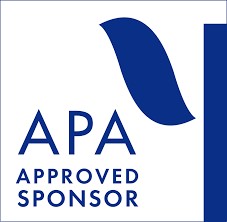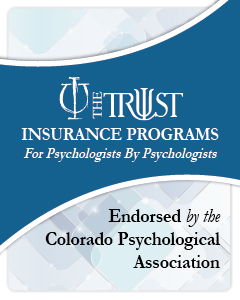|
CPA Webinar: Staying Current on Diagnostics: What’s new in the DSM-5-TR?
Monday, December 05, 2022, 12:00 PM - 2:00 PM MDT
Category: CPA Webinar
CPA CE Webinar:
Staying Current on Diagnostics: What’s new in the DSM-5-TR?
Monday, December 05, 2022
12:00PM - 2:00PM MT
Early Bird Registration: Ends 11/23/2022
CPA Members: $60.00
Non-Members: $120.00
CPA Student Members: $20.00
Non-Member Students: $40.00
Regular Registration: 11/24/2022 - 12/05/2022
CPA Members: $70.00
Non-Members: $140.00
CPA Student Members: $20.00
Non-Member Students: $40.00
*If you are a non-member student wanting to register, please reach out to [email protected] to receive a discount code
Description: In 2013, the American Psychiatric Association published the updated version of the Diagnostic and Statistical Manual, the DSM-5. This expanded, more contemporary version of the DSM including substantial changes which modified diagnoses, such as Autism Spectrum Disorder and Intellectual Disabilities. It also reorganized the structure of the DSM to classify disorders in slightly different ways, such as eliminating “Mood Disorders” as a diagnostic category in favor of separate categories for “Depressive Disorders” and “Bipolar Disorders.” The primary goals of the DSM-5 were to streamline diagnoses and better align the DSM with the International Classification of Disease (ICD). The revision of the DSM-5 was not without controversy, as the mental health community adjusted to changes in the diagnostic criteria.
Like previous versions of the DSM, the use of the DSM over the past 9 years revealed aspects of the manual that still needed clarification and modification. Whereas the recommended clarifications and revisions did not warrant a move to DSM-6, enough updates were recommended to lead to the publication of the DSM-5-Text Revision (DSM-5-TR), released in March 2022. In addition to aligning codes with ICD-10, the DSM-5-TR includes modifications that will likely influence some aspects of clinical work, including the inclusion of a new diagnosis of Prolonged Grief Disorder. This workshop will provide a quick overview of the major changes. Attendees will also have a chance to reflect on potential implications for practice, especially related to Prolonged Grief Disorder and the impact of racism/discrimination on symptom presentation.
Program Level: Intermediate
Program Schedule:
- 12:00 PM to 12:30 PM: Intro to DSM diagnostic system and development
- 12:30 PM to 1:00 PM: Groupwork around DSM-5 usage and issues
- 1:00 PM to 1:45 PM: DSM-5-TR changes/additions
- 1:45 PM to 2:00 PM: Q & A
Learning Objectives:
- Attendees will gain knowledge on revisions included in the DSM-5-TR.
- Attendees will be able to describe the new diagnosis of Prolonged Grief Disorder.
- Attendees will reflect on the inclusion of identifying the impact of racism and discrimination on psychological symptoms.
- Attendees will be able to reflect on changes and implication for clinical practice.
Speakers: Megan Wrona, PhD. & Brian Burke, PhD.
 Megan Wrona earned her PhD in Counseling Psychology from the University of Utah and is currently an Associate Professor of Psychology at Fort Lewis College. Dr. Wrona researches the associations among acculturation and acculturative stress and substance abuse treatment outcomes for Latino adolescents. She completed a post-doctoral residency at the University of Utah’s Neuropsychiatric Institute (now Huntsman Mental Health Institute), working with adolescents and children with acute psychiatric issues. She also worked with Psychological Solutions, providing psychological evaluations to adolescents and young adults in wilderness therapy programs. During her doctoral training, she served as the program coordinator for the Validating Interventions for Diverse Adolescents (VIDA) program, work funded by the National Institute on Drug Abuse. At Fort Lewis, Dr. Wrona is the psychology faculty liaison for the Four Corners Master of Social Work program in collaboration with the University of Denver as well as the faculty advisor for the Indigenous Society of Psychologists student group. She has authored many book chapters and articles and recently published an undergraduate abnormal psychology textbook with her colleague, Dr. Brian Burke. Dr. Wrona is a licensed psychologist in Colorado and Utah. She is a member of the American Psychological Association and its Counseling Psychology Division. She is also a member of the Rocky Mountain Psychological Association (RMPA). Megan Wrona earned her PhD in Counseling Psychology from the University of Utah and is currently an Associate Professor of Psychology at Fort Lewis College. Dr. Wrona researches the associations among acculturation and acculturative stress and substance abuse treatment outcomes for Latino adolescents. She completed a post-doctoral residency at the University of Utah’s Neuropsychiatric Institute (now Huntsman Mental Health Institute), working with adolescents and children with acute psychiatric issues. She also worked with Psychological Solutions, providing psychological evaluations to adolescents and young adults in wilderness therapy programs. During her doctoral training, she served as the program coordinator for the Validating Interventions for Diverse Adolescents (VIDA) program, work funded by the National Institute on Drug Abuse. At Fort Lewis, Dr. Wrona is the psychology faculty liaison for the Four Corners Master of Social Work program in collaboration with the University of Denver as well as the faculty advisor for the Indigenous Society of Psychologists student group. She has authored many book chapters and articles and recently published an undergraduate abnormal psychology textbook with her colleague, Dr. Brian Burke. Dr. Wrona is a licensed psychologist in Colorado and Utah. She is a member of the American Psychological Association and its Counseling Psychology Division. She is also a member of the Rocky Mountain Psychological Association (RMPA).
 Brian Burke joined FLC's faculty in 2003. Dr. Burke is a clinical psychologist whose research interests include motivational interviewing, terror management theory, and college teaching. He has published several meta-analyses of studies evaluating the efficacy of motivational interviewing, an emerging treatment for substance use and other problem behaviors that combines the humanistic elements of client-centered therapy with more active strategies designed to facilitate human change. He has also published several meta-analyses of terror management theory, which states that much of what humans do may be a defense against our inevitable mortality. Dr. Burke has served as assistant training director for the Student Counseling Center at FLC. He has published numerous articles and book chapters, and is the coauthor of Abnormal Psychology, an undergraduate textbook in its third edition. Dr. Burke also presents at professional research conferences around the country and has served as President of the Rocky Mountain Psychological Association (RMPA) and Chair of the Mountain States Conference on the Teaching of Psychology. He has taught USAC classes on the psychology of happiness in countries such as Costa Rica, Chile, India, and Brazil and he currently teaches a 5-week Summer Field Course in Clinical Psychology, in which FLC students work at forensic patient-care facilities in the Front Range. Brian Burke joined FLC's faculty in 2003. Dr. Burke is a clinical psychologist whose research interests include motivational interviewing, terror management theory, and college teaching. He has published several meta-analyses of studies evaluating the efficacy of motivational interviewing, an emerging treatment for substance use and other problem behaviors that combines the humanistic elements of client-centered therapy with more active strategies designed to facilitate human change. He has also published several meta-analyses of terror management theory, which states that much of what humans do may be a defense against our inevitable mortality. Dr. Burke has served as assistant training director for the Student Counseling Center at FLC. He has published numerous articles and book chapters, and is the coauthor of Abnormal Psychology, an undergraduate textbook in its third edition. Dr. Burke also presents at professional research conferences around the country and has served as President of the Rocky Mountain Psychological Association (RMPA) and Chair of the Mountain States Conference on the Teaching of Psychology. He has taught USAC classes on the psychology of happiness in countries such as Costa Rica, Chile, India, and Brazil and he currently teaches a 5-week Summer Field Course in Clinical Psychology, in which FLC students work at forensic patient-care facilities in the Front Range.
|

The Colorado Psychological Association (CPA) is approved by the American Psychological Association to sponsor continuing education for psychologists. CPA maintains responsibility for this program and its content.
|
|

 Prev Month
Prev Month View Month
View Month Search
Search Go to Month
Go to Month Next Month
Next Month
 Brian Burke joined FLC's faculty in 2003. Dr. Burke is a clinical psychologist whose research interests include motivational interviewing, terror management theory, and college teaching. He has published several meta-analyses of studies evaluating the efficacy of motivational interviewing, an emerging treatment for substance use and other problem behaviors that combines the humanistic elements of client-centered therapy with more active strategies designed to facilitate human change. He has also published several meta-analyses of terror management theory, which states that much of what humans do may be a defense against our inevitable mortality. Dr. Burke has served as assistant training director for the Student Counseling Center at FLC. He has published numerous articles and book chapters, and is the coauthor of Abnormal Psychology, an undergraduate textbook in its third edition. Dr. Burke also presents at professional research conferences around the country and has served as President of the Rocky Mountain Psychological Association (RMPA) and Chair of the Mountain States Conference on the Teaching of Psychology. He has taught USAC classes on the psychology of happiness in countries such as Costa Rica, Chile, India, and Brazil and he currently teaches a 5-week Summer Field Course in Clinical Psychology, in which FLC students work at forensic patient-care facilities in the Front Range.
Brian Burke joined FLC's faculty in 2003. Dr. Burke is a clinical psychologist whose research interests include motivational interviewing, terror management theory, and college teaching. He has published several meta-analyses of studies evaluating the efficacy of motivational interviewing, an emerging treatment for substance use and other problem behaviors that combines the humanistic elements of client-centered therapy with more active strategies designed to facilitate human change. He has also published several meta-analyses of terror management theory, which states that much of what humans do may be a defense against our inevitable mortality. Dr. Burke has served as assistant training director for the Student Counseling Center at FLC. He has published numerous articles and book chapters, and is the coauthor of Abnormal Psychology, an undergraduate textbook in its third edition. Dr. Burke also presents at professional research conferences around the country and has served as President of the Rocky Mountain Psychological Association (RMPA) and Chair of the Mountain States Conference on the Teaching of Psychology. He has taught USAC classes on the psychology of happiness in countries such as Costa Rica, Chile, India, and Brazil and he currently teaches a 5-week Summer Field Course in Clinical Psychology, in which FLC students work at forensic patient-care facilities in the Front Range.
 Export Event
Export Event 